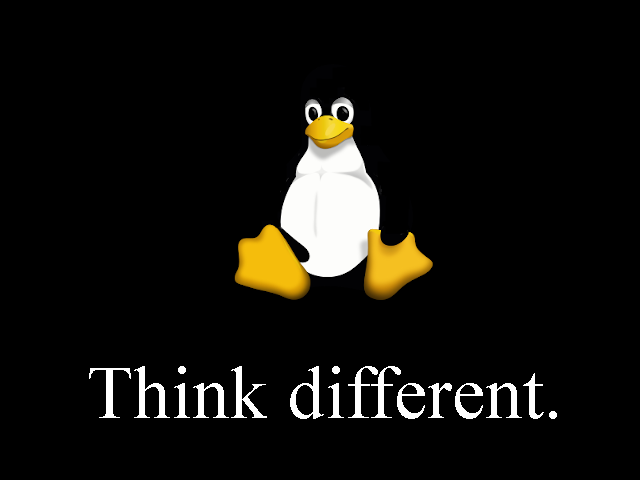- owns the entire stack and creates high quality highly optimized systems
- creates closed lock-in systems without inter-operability and actively fights users from owning their devices
- do they give back enough to open source, or do they leech mostly?
Of course, this only made sense when Apple was more of an underdog to IBM, and Ciro Santilli greatly admires their defiance of the norm.
As of 2020 however, Apple is kind of on the top of the mobile world, and Think different simply makes no sense anymore, notably because it relies on closed source offline software used by millions.
it's Popular Now It Sucks comes to mind.
This is a trap every company that prides itself on it's "alternative culture" sets for itself. If they succeed, they could become the norm.
1976 Think different. 2011 Think mainstream
. Cropped from wallpapersafari.com/w/RqYUEj.1984 Macintosh advertisement by Apple (1984)
Source. This ad suggests that Apple was the new thinker that would destroy IBM, as Steve Jobs said it himself when introducing the ad: www.youtube.com/watch?v=zlQvMp5rB6g. And then Apple became IBM in the 2000's starting with the launch of the iPod and then leading up to the iPhone.Because the people who are crazy enough to think they can change the world are the ones who do.
Steve Jobs' Apple-1 sells for $945k
. Source. Nice looking and expensive operating system by Apple. Ciro Santilli believes that:
- if you want to be ripped off, just use Microsoft Windows which has more software available
- or if you want to attain Enlightenment, just use Linux, which is free and open source
The story of how OS X was ported to x86 from PowerPC with large initial work up to boot by a single man in the year 2000, John Kullmann, is really worth reading: www.quora.com/Apple-company/How-does-Apple-keep-secrets-so-well/answer/Kim-Scheinberg on Quora, see also:
Co-founder of Apple.
Is Jobs evil? Is he interesting? Undoubtedly.
www.folklore.org/ProjectView.py?project=Macintosh&characters=Steve%20Jobs has some good anecdotes about him.
Ciro Santilli is especially fond of: Jobs and Wozniak's blue box.
Good quotes:
- "Try to have a nice family life, have fun, save a little money." quote at: Section "Don't be a pussy" and the related Jobs and Wozniak's blue box attitude
- "Steve Jobs Insult Response" on backward design
- Steve Jobs Pixar office design philosophy: great ideas happen from chance meetings on corridors, not in board rooms: officesnapshots.com/2012/07/16/pixar-headquarters-and-the-legacy-of-steve-jobs/
- Steve Jobs' 2005 Stanford Commencement Address
- Here's to the crazy ones: Ciro would like to believe that this is mostly written by Jobs, but apparently it was just written by an advertisement agency. Good job though.
You must watch this: Video "Bill Gates vs Steve Jobs by Epic Rap Battles of History (2012)".
Evil deeds:
- not recognizing own daughter for many years??? en.wikipedia.org/wiki/Lisa_Brennan-Jobs
- lying to Steve Wozniak about the 5000 dollar Atari bonus: web.archive.org/web/20110612071502/http://www.woz.org/letters/general/91.html
- not giving stock to early garage employees: www.businessinsider.com/steve-wozniak-gave-early-apple-employees-10-million-in-stock-2014-9 OK, not a legal obligation. But... love?
This idea also comes up in other sources of course.
TODO clear attribution source:
Some people say, "Give the customers what they want." But that's not my approach. Our job is to figure out what they're going to want before they do. I think Henry Ford once said, "If I'd asked customers what they wanted, they would have told me, 'A faster horse!'" People don't know what they want until you show it to them. That's why I never rely on market research. Our task is to read things that are not yet on the page.
Ciro Santilli likes Magic: The Gathering and he was pleased when he learned that Steve Wozniak does too, and has an expensive collection: redsunsoft.com/2019/03/how-a-post-to-play-magictg-turned-into-an-afternoon-with-the-woz/
Some have actually been preserved: en.wikipedia.org/wiki/File:Blue_Box_in_museum.jpg
The japanese name literally means:
- 富士 fushi, from Mount Fuji, which itself has unknown origin
- 通 tong: telecommunications
But the pre-Internet impact of IBM was insane! Including notably:
- some of the most important business computers of the pre-personal computer era
- SQL
- IBM Generalized Markup Language, which is a predecessor to XML and HTML
This is a family of computers. It was a big success. It appears that this was a big unification project of previous architectures. And it also gave software portability guarantees with future systems, since writing software was starting to become as expensive as the hardware itself.
Articles by others on the same topic
There are currently no matching articles.

